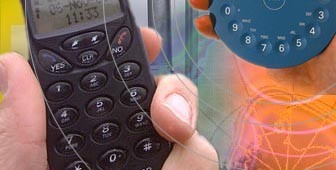Swiss UMTS licences to go under the hammer

Tension is mounting in the Swiss telecommunications industry as operators prepare for Monday's auction of third generation mobile licences.
At nine o’clock in the morning, all eyes will be on the Internet at “umtsauction.ch” as the bidding starts for four Swiss licences for the Universal Mobile Telecommunications System (UMTS).
The new licences will enable providers to offer in the future a new range of fast mobile Internet, data and multimedia services that are way beyond the existing capabilities of current Global System for Mobile (GSM) networks.
The withdrawal of some bidders late last week has dampened expectations about the revenues the licences should generate.
There are only five of the original 10 bidders in the starting blocks in an auction that is being seen as another step in the battle for a share of Europe’s lucrative mobile telecommunications market.
Billions have passed into European government coffers as a result of auctions and other licence-granting procedures carried out over the past few months.
UMTS licences in Germany went for SFr79 billion ($45 billion) and the British government attracted SFr56 billion. However, there have also been disappointments and failures.
The auction in Italy was labelled “an Italian farce” and a “Roman tragedy”, after the bidders managed to secure the licences for a total of only SFr18 billion.
Licences in the Netherlands attracted SFr4 billion and only SFr1.07 billion in Austria.
The Federal Office for Communications in Biel is well aware of its responsibility in maximising revenues for the Swiss federal coffers. But its director, Marc Furrer, says financial considerations need to be weighed against the quality of operators.
“The main aim is to have a fair and transparent auction so that at the end of it we have four good operators,” he told swissinfo.
It is anyone’s guess as to how much each of the nationwide licences will fetch but branch analysts are predicting that operators will have to pay between SFr1 billion and SFR2 billion for the much-coveted prize. The bidding starts at SFr50 million.
Two of the clear favourites to gain a licence are the former Swiss telecommunications monopoly holder Swisscom and Orange. They both strengthened their positions recently, with Swisscom entering into an alliance with Britain’s Vodafone and Orange receiving support from France Telecom.
“It’s important that we have a licence,” says Jens Alder, chief executive officer of Swisscom. “Mobile is one of our core businesses and a licence is a scarce resource. Not having a frequency means a competitor has it, so we have to protect our business.”
Orange in Lausanne entered the Swiss market only 18 months ago and it sees a licence as the best way to compete in Switzerland.
“We’re very much certain that we’ll get a licence… we build a service around an invisible resource called spectrum and without that spectrum we don’t have a business, so therefore we have to invest whatever the market price is in order to continue the business,” says Orange’s Jamie MacDonald, General Manager for Marketing, Sales and Customer Care.
“The third generation will bring about the sort of things that people have been talking about for a long time, whether it be the picture phone or certainly the intersection between Internet and mobile,” he added.
With four licences on offer, UMTS is going to bring a new player into the Swiss mobile market, which is currently dominated by Swisscom, Orange and Diax.
But the company that gains a licence is going to have to fork out huge sums in infrastructure costs, and to contend with strong public opposition.
It’s estimated 12,000 new antennae will be needed to serve Switzerland’s mobile phone market, and there is already growing opposition to further installations. The chief worry is over the radiation emitted by these antennae – known as electrosmog – which is said to be harmful to human health.
Earlier this month, environmental organisations called for the maximum permitted level of radiation – currently six volts per metre – to be reduced by 90 per cent.
Marc Furrer says Switzerland has the toughest regulations concerning protection of the environment. “In England, Germany, France and Austria, they all have ten times less (radiation) protection than Switzerland,” he told swissinfo.
“The fact that that we need so many antennae is exactly because the (radiation) limits are so low and that means that you have to have more antennae. We have strict rules and we take the environmentalists’ concerns seriously but now we have to go ahead with the infrastructure,” he added.
Five of the original 10 auction participants, Cablecom, Hutchison, Teldotcom, T-Mobil and Telenor have withdrawn from the race.
The remaining bidders include: dSpeed, Orange, Sunrise, Swisscom and Team 3G.
by Robert Brookes
www.umtsauction.ch

In compliance with the JTI standards
More: SWI swissinfo.ch certified by the Journalism Trust Initiative








You can find an overview of ongoing debates with our journalists here . Please join us!
If you want to start a conversation about a topic raised in this article or want to report factual errors, email us at english@swissinfo.ch.